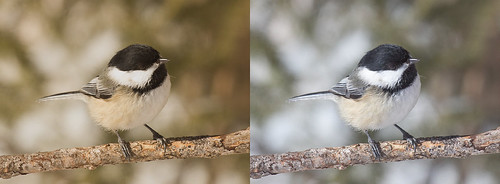(Oops! I'm always getting left and right confused, and reversed which eye was which in part of my podcast! This has it right--or, I should say, correct.)
On Wednesday, I got the cataracts in my left eye removed. When I had the right eye done on December 4, my vision through that eye was blurry all day. That must have been partly a function of the dilation drops they gave me before surgery. I don’t think this nurse gave me as many, and even by Wednesday afternoon I was comfortable looking out the window without my sunglasses. Today I’m perfectly comfortable without them, even outside. And as early as Wednesday, I could see well through both eyes, together and independently. Today it’s even better.
On Thursday, I had an early morning eye doctor appointment, which Russ drove me to in the dark. Through my left eye, headlights had dramatic lines of light shooting out, exactly as they did through my right eye the day after that surgery. But for the first time ever, I don’t see any weird halos of light around lights—either while Russ was driving in the dark or in other situations. Our Christmas tree lights are as brilliant as I’ve ever seen them.
Unlike on Saturday, when Duluth’s Christmas Bird Count took place and so Russ paid attention to our mostly empty feeders all day, on Thursday they were busy enough for me to enjoy testing my new, improved vision. I can clearly see chickadees way in the back of our yard, something I’ve not been able to do even with eyeglasses for as long as I can remember. Knowing chickadees so well, this hasn’t hampered my recognizing them by their shape, the way they fly, and just something magical about them, but it’s so wonderful to see their perfect white cheeks, gray back with white edgings on the flight feathers, pure white underside, and buffy sides from so far away, without grabbing for my binoculars. Without eyeglasses, I can even tell if a Hairy or Downy Woodpecker way back there is a male or female.
I tried out my binoculars Thursday, and it’s like I got new ones—everything is so much brighter and clearer! And having the eyecups extended, because I’m not wearing glasses, makes the view even better—those eyecups hold the eyes at exactly the right distance to give the optimal magnification AND block peripheral light. So when I do get bifocals, I’m still going to do most of my birding without glasses. I’ll still have to keep reading glasses or bifocals near for when I enter my birds into eBird on my phone or check my camera’s screen to review photos.
The problem with my perfect distance vision is that nothing close is in focus. We stopped at a store to buy some reading glasses en route to my second surgery to get ones that work with the right eye. I was surprised how well they’re working—I got one pair for my desk treadmill, and a stronger pair for closer work. I can wear them low on my nose when watching TV while working on my laptop. I’m keeping that pair on a chain around my neck because there are lots of times when I need to see something close. I won’t be able to drive until I get bifocals—I can see the road ahead, signs, and everything I need outside the car better than ever, but can’t read the dashboard at all. I’ll wait 10 days or so to get my first pair of bifocals. If my eyes do any changing beyond that, I’ll use the first pair as a backup.
Cataracts build up slowly, and since mine are congenital, I may have never in my life been able to appreciate just how blue the sky is before. Having this surgery has literally given me a brighter outlook. Cataract surgery has an extremely high success rate, though there are occasional problems with it. But in the case of this 68-year-old, cataract surgery has left me not just much improved, but better than ever.
